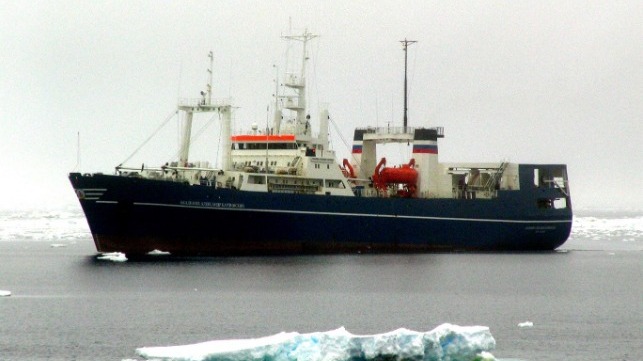UK’s Parliament Probes Russian Oil Exploration in Antarctica

As part of its ongoing examination of the UK’s interests in Antarctica, the House of Commons’ Environmental Audit Committee (EAC) last week held a special session on Russian oil exploration in the polar region. The inquiry saw three ministers grilled on Russian oil prospecting activities in Antarctica, which are believed to fall within the UK’s claimed territory in the region.
In 2020, Russian mineral exploration company Rosgeo reported that its research vessel Alexander Karpinsky had completed a comprehensive sub-surface geological survey, mapping oil and gas bearing prospects on the Antarctic ice shelves. The study was part of the 65th Russian Antarctic expedition. At the time, the exploration covered the southeastern part of the Riiser-Larsen Sea off the coast of Queen Maud Land, an Antarctic region claimed by Norway.
However, EAC heard that since 2011, Russian seismic surveys have been happening off the Weddell Sea, which falls under the UK’s claim in Antarctic territory. According to Rosgeo, its surveys have revealed approximately 500 billion barrels (70 billion tons) of hydrocarbon potential in the Southern Ocean’s basins.
While giving his submissions to EAC, Junior Minister at Foreign, Commonwealth and Development Office David Rutley, said that Russia has given a commitment to abide by the Antarctic Treaty. In 1976, the treaty nations signatories decided to impose a moratorium on the exploration and exploitation of Antarctic minerals, taking a precautionary approach to protecting the region.
But countries such as Russia have continued with mineral exploration under the guise of scientific research, which is permissible under the treaty. In total, Antarctica has seven historic claimants including Argentina, Australia, Chile, France, New Zealand, Norway and the UK. However, these claims of ownership were suspended when the Antarctic Treaty was negotiated in 1959, making Antarctica an enormous no man’s land.

that matters most
Get the latest maritime news delivered to your inbox daily.
Unfortunately, the governance of the earth’s polar regions has come under immense stress since Russia invaded Ukraine in 2022. Experts have warned that the worsening relationship between Russia and the West could culminate in competition rather than collaboration in conserving the integrity of Antarctica. This has already started to manifest, with China and Russia blocking attempts by other Antarctic treaty nations to expand marine protected areas in the region.
“Russia’s collection of seismic data in Antarctica construed as prospecting signals a potential threat to the permanent ban on mining, with knock-on implications for the integrity of the protocol in its entirety. In 2048, there is scope for potential change to the protocol but there are strict rules and pre-conditions that shape that scope. But the current Russian activity is troubling,” Klaus Dodds, Professor of Geopolitics at the University of London informed EAC in a written submission.
